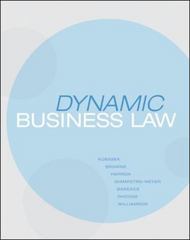Question
Case Study: Turkey and Islam For years now, Turkey has been lobbying the European Union to allow it to join the free trade bloc as
Case Study: Turkey and Islam
For years now, Turkey has been lobbying the European Union to allow it to join the free trade bloc as a member state. If the EU says yes, it will be the first Muslim state in the union. But this is unlikely to happen any time soon; after all, it has been half a century in the making! Many critics in the EU worry that Islam and Western-style capitalism do not mix well and that, as a consequence, allowing Turkey into the EU would be a mistake. However, a close look at what is going on in Turkey suggests this view may be misplaced. Consider the area around the city of Kayseri in central Turkey. Many dismiss this poor, largely agricultural region of Turkey as a non-European backwater, far removed from the secular bustle of Istanbul. It is a region where traditional Islamic values hold sway. And yet it is a region that has produced so many thriving Muslim enterprises that it is sometimes called the "Anatolian Tiger." Businesses based here include large food manufacturers, textile companies, furniture manufacturers, and engineering enterprises, many of which export a substantial percentage of their production. Local business leaders attribute the success of companies in the region to an entrepreneurial spirit that they say is part of Islam. They point out that the Prophet Muhammad, who was himself a trader, preached merchant honor and commanded that 90 percent of a Muslim's life be devoted to work in order to put food on the table. Outside observers have gone further, arguing that what is occurring around Kayseri is an example of Islamic Calvinism, a fusion of traditional
Islamic values and the work ethic often associated with Protestantism in general and Calvinism in particular. However, not everyone agrees that Islam is the driving force behind the region's success. Saffet Arslan, the managing director of Ipek, the largest furniture producer in the region (which exports to more than 30countries), says another force is at work: globalization! According to Arslan, over the past three decades, local Muslims who once eschewed making money in favor of focusing on religion are now making business a priority. They see the Western world, and Western capitalism, as a model, not Islam, and because of globalization and the opportunities associated with it, they want to become successful. If there is a weakness in the Islamic model of business that is emerging in places such as Kayseri, some say it can be found in traditional attitudes toward the role of women in the workplace and the low level of female employment in the region. According to a report by the European Stability Initiative, the same group that holds up the Kayseri region as an example of Islamic Calvinism, the low participation of women in the local workforce is the Achilles' heel of the economy and may stymie the attempts of the region to catch up with the countries of the European Union.
Questions:-
a.Can you see anything in the values and norms of Islam that is hostile to business?
b.What does the experience of the region around Kayseri teach about the relationship between Islam and business?
c.What are the implications of Islamic values toward business for the participation of a country such as Turkey in the global economy or becoming a member of the European Union?
Step by Step Solution
There are 3 Steps involved in it
Step: 1

Get Instant Access to Expert-Tailored Solutions
See step-by-step solutions with expert insights and AI powered tools for academic success
Step: 2

Step: 3

Ace Your Homework with AI
Get the answers you need in no time with our AI-driven, step-by-step assistance
Get Started


